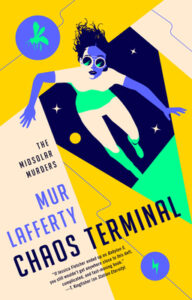and illustrated by Bernd Kissel, subtitled “Du würdest es eh nicht glauben” — You Wouldn’t Believe it Anyway
This second volume of the kangaroo comics concludes the hardback publication of the odd couple’s 2020–23 run in Germany’s leading intellectual weekly newspaper. There are some nice touches in the two volumes: the first is dedicated “For me!” and the second “For you!”; the cartoons on the endpapers reverse each other; the illustrations before both title pages feature the kangaroo and Marc-Uwe in related characteristic poses. The second also has a “What Has Gone Before” that recaps the first meeting of Marc-Uwe and the kangaroo 18 years ago, though it changes the final gag just a little bit. I’m not sure that it would be enough of an introduction for someone coming to the comics with no previous knowledge of the characters, but it’s unlikely that anyone in that category will be buying this collection anyway. For long-time fans, it’s a warm and fuzzy way to remember their first encounter with this improbable human-marsupial pair.
This collection continues very much in the style of the first: topical commentary, meta-jokes, clever wordplay, a mix of one-day gags and longer riffs that last through a week’s worth of strips or more. Some of the one-day jokes include a return visit to a dark restaurant where Marc-Uwe and the kangaroo play rock-paper-scissors to decide who pays the bill, or a full-color “Kafka for Kids.” There’s a lengthier stretch where the two invent new Olympic sports such as judo–field hockey or pillow fight–weighlifting. For the month of the strip’s summer break, the book shows how writer and illustrator went on tour together to do a sort of comic-strip improv. They took suggestions from the audience, that Kling developed into dialog and Kissel drew while the two of them were on stage. There are also a couple of examples of cartoons they did for a charity benefit, the best of which was a poster with the legend “Yes, We Käng” featuring a headshot of the kangaroo in the style of the famous Obama “Hope” poster. For the end of 2022 there’s a lovely single-panel parody of a comedy sketch that’s a staple of German culture — a short film in English called “Dinner for One,” that’s shown every New Year’s Eve in Germany (and a couple of other places) so that it’s practically universally known here and utterly unknown in Britain. It’s a fun bit of Känguru humor that could only be realized in this medium. The last bit begins with a meta-joke about the comic form, and the follow-ups bring the excursion to a fitting, if not completely closed, conclusion.
There’s not a whole lot to add about the second volume, as compared to the first. It’s funny, it fits the characters, it explores the medium a bit. It’s not a good place to begin. The place to begin for English speakers is the print translation of The Kangaroo Chronicles; for German speakers who have somehow missed the phenomenon, the place to begin is the audio version of Die Känguru Chroniken. In either case, a treat.










